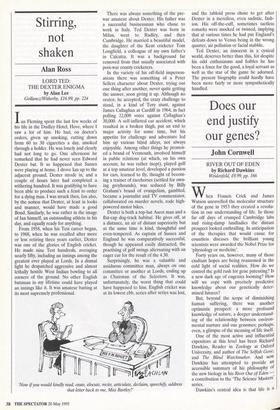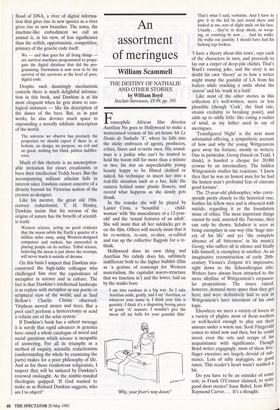Does our end justify our genes?
John Cornwell
RIVER OUT OF EDEN by Richard Dawkins Weidenfeld, £9.99, pp. 166 When Francis Crick and James Watson unravelled the molecular structure of the gene in 1953 they created a revolu- tion in our understanding of life. In those far off days of cramped Cambridge labs and rising-damp landladies the distant prospect looked enthralling. In anticipation of the therapies that would ensue for countless diseases the brilliant young scientists were awarded the Nobel Prize for `physiology or medicine'.
Forty years on, however, many of those exultant hopes are being reassessed in the cold light of social realities. How do we control the gold rush for gene patenting? Is a new dark age of eugenics looming? How will we cope with precisely predictive knowledge about our genetically deter- mined futures?
But, beyond the scope of diminishing human suffering, there was another optimistic prospect: a more profound knowledge of nature, a deeper understand- ing of the relationship between environ- mental nurture and our genomes; perhaps, even, a glimpse of the meaning of life itself. One of the most active and influential expositors at this level has been Richard Dawkins, Reader in Zoology at Oxford University, and author of The Selfish Gene, and The Blind Watchmaker. And now Dawkins has attempted to provide an accessible summary of his philosophy of the new biology in his River Out of Eden --; a contribution to the 'The Science Masters' series.
Dawkins's central idea is that life is a flood of DNA, a river of digital informa- tion that gives rise to new species as a river gives rise to new branches. The soma, the machine-like embodiment we call an animal is, in his view, of less significance than the selfish, opportunistic, competitive, primacy of the genetic code itself:
We — and that goes for all living things are survival machines programmed to propa- gate the digital database that did the pro- gramming. Darwinism is now seen to be the survival of the survivors at the level of pure, digital code.
Despite such dauntingly mechanistic conceits there is much delightful informa- tion in this book, and Dawkins is at his most eloquent when he gets down to zoo- logical instances — like his description of the dance of the bees. But, as in past works, he also devotes much space to expounding a morally nihilistic description of the world:
The universe we observe has precisely the properties we should expect if there is, at bottom, no design, no purpose, no evil and no good, nothing but blind, pitiless indiffer- ence.
Much of this rhetoric is an unexception- able invitation for closet creationists to burn their intellectual Teddy bears. But the accompanying militant atheism fails to interest since Dawkins cannot conceive of a divinity beyond his Victorian notion of the creator-as-designer.
Like his mentor, the great old 19th- century reductionist, T. H. Huxley, Dawkins insists that his version of the origins of nature has the benefit of scientif- ic truth: Western science, acting on good evidence that the moon orbits the Earth a quarter of a million miles away, using Western-designed computers and rockets, has succeeded in placing people on its surface. Tribal science, believing the moon is just above the treetops, will never touch it outside of dreams.
On this basis I suspect that Dawkins mis- construed the high-table colleague who challenged him over the equivalence of metaphor in science and in culture. The fact is that Dawkins's intellectual landscape is as replete with metaphor as any poetic or scriptural view of the world; and as Saul Bellow's Charlie Citrine observed: `Orpheus moved stones and trees. But a poet can't perform a hysterectomy or send a vehicle out of the solar system.'
If Dawkins's book has a salient message it is surely that rapid advances in genetics have raised a whole catalogue of moral and social questions which science is incapable of answering. For all its triumphs as a method of enquiry, scientific reductionism (understanding the whole by examining the parts) makes for a poor philosophy of life. And as for those recalcitrant religionists, I suspect they will be unfazed by Dawkins's renewed onslaught. As the nimble-minded theologian quipped: 'If God wanted to make us as Richard Dawkins suggests, who am I to object!'



































































 Previous page
Previous page